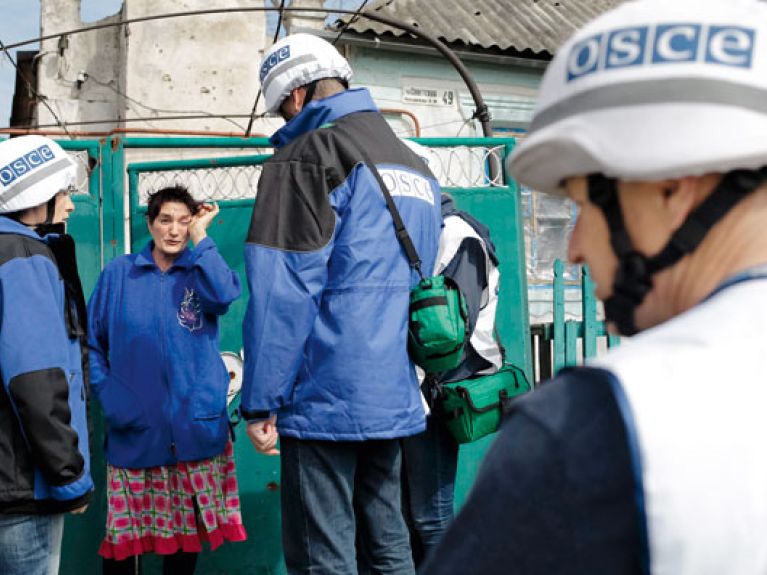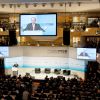A mission for democracy and security
Thousands of voluntary election observers are promoting democracy worldwide.

In May 2014, the eyes of the world were on the presidential election in Ukraine. Given the tense political situation, it was particularly important that the Organization for Security and Co-operation in Europe (OSCE) put its seal of approval on the democratic nature of the process. The election was, the OSCE concluded, characterised by a high turnout and a clear resolve on the part of the authorities to hold a genuine election in line with international commitments and that respected fundamental freedoms; and with the exception of the Crimea, Donetsk and Lugansk regions, they were, on the whole, successful.
But the OSCE also had a few complaints and suggestions for improvements – for example, regarding the selection, independence and training of the District Election Commissions. Nevertheless, the commissions were, it said, largely in control of the situation.
That is the tenor of the report by Tana de Zulueta, head of the election observation mission. But how did the former Italian senator reach this conclusion? It was drawn from the summary of findings collected by a team of more than a thousand people. Twenty-four experts, 100 long-term observers and on election day an additional 1,025 short-term observers from all 46 OSCE participating states were watching to see if everything went off correctly.
Germany seconds observers to OSCE and European Union missions. They are able to rely on well-established procedures, in some cases decades of experience, and their institutional independence. That distinguishes them – and the quality of their judgement – from, say, those politicians of various right-wing European parties that, likewise in 2014, were happy to certify the democratic nature of the Russian-held referendum in Crimea on the region’s joining the Russian Federation.
The mission heads are usually active or former politicians. The EU generally seconds European Parliament members – as in the case of the 2012 secondment to Libya of the German politician Alexander Graf Lambsdorff, now Vice-President of the European Parliament. They are assisted by a core team comprising a handful of experts on law and administration, logistics and public relations, as well as regional officials. The long-term observers and the numerous short-term observers are volunteers who can expect an expense allowance at best.
Long-term observers can receive a reasonable allowance – for example, in the case of an election in a dangerous country where the assignment lasts six weeks. But they have to frequently submit applications, and often there are only two missions a year. Long-term observers must be able to pack their bags at short notice if they are accepted, and be willing to be deployed to the most remote regions – for example, Guinea-Bissau or Nepal. And they should also have had the necessary vaccinations for travel to the tropics.
What sort of people volunteer to take on such jobs? They are mostly academics, political scientists or legal professionals, globetrotters and idealists. For some, it’s extra income to supplement their pension; for others, it’s a sideline besides photojournalism; yet others enjoy visiting remote places and meeting interesting people.
Wolfgang von Schmettau is an old hand at this. The 70-year-old German has observed 25 elections since he first realised that this is what he wanted to do. It all started in Kazakhstan in 2004. His next assignments included Afghanistan and East Timor, Macedonia and Ecuador. The job also took him to numerous African countries and six times alone to Ukraine – including 2014, of course. In the election year, he was deployed in Galicia – in the west of the country, then, where there was no sign of the war. “There were no thorny issues there,” he says. “It was more or less business as usual.” His report to the mission head mentioned just a few trivial matters: on one occasion, the staff at a polling station weren’t properly acquainted with the legal regulations, with the result that invalid votes and abstentions ended up in the same tray. These sort of things are then included in the final report and the recommendations.
The Federal Foreign Office, to which Schmettau applied around the turn of the millennium, initially asked him to participate in a two-week course organised by the then newly launched Center for International Peace Operations (ZIF). The subjects addressed included Crisis Policy-making, Restoring Stability, Intercultural Competence, Personal Resilience and Stress Management. Schmettau now puts his own experience at ZIF’s disposal. Some EU partners also use ZIF for training purposes. Between 2002 and 2014, ZIF recruited some 3,800 election observers for OSCE and EU missions.
At their place of deployment, the observers are sent out in teams of two, each comprising a man and a woman from different countries. Once they have set off, they are left to their own devices. That can be a challenge in itself because even if the personal chemistry is not quite right, they still have to work together. Once a week, they have to report to the head team. A car and driver are provided, and a translator if needed. The main job of the short-term observers is to observe the polling process and the ballot counting. In all, a mission takes around ten days: travelling to the respective country, attending a briefing in the capital on the country’s peculiarities and electoral law, then the journey “into the field”. Those who prove up to the job in this situation are also suitable candidates for deployments lasting several weeks.
Wolfgang von Schmettau usually tries to participate in long-term missions. One of the key tasks of voluntary election observers like him is to talk to as many people as possible in a particular place – mostly in a provincial city: bishops or imams, associations or women’s groups, election candidates and the local election authorities. They observe political parties and election rallies and try to capture the mood and get a sense of the political forces at work: Is there evidence of demagogy or intimidation? Are there calls on the radio for a peaceful election? How is the electoral registration process going?
The people who have watched all this for a couple of weeks brief the short-term observers on the region in question and assign them to their respective deployment areas. They are told, for example, whether a certain candidate’s behaviour towards his or her opponents is particularly polemical. Or whether there are wealthy individuals, property or factory owners who are known to be acting like feudal lords, telling people who to vote for. Sometimes vote buying is also an issue. Here, the observers rely on informers, mostly the supposed victims. But in their briefings they are strongly advised to be cautious about any information that is reported to them. Not to be taken in by rumours or slander. That’s where experience comes in.
The focus, of course, is on the election day. The observers choose a route that takes in as many polling stations as possible. In one of them, they watch while the last vote is cast, the polling station is closed and the ballots are counted. Then they accompany the transportation of the results to the counting centre. There they remain until the protocol is approved. In Ukraine in 2014, Schmettau and his team partner observed ten of the 80 polling stations in their area. The head team’s statisticians then conduct spot checks before reaching their final assessment.
Only once has Schmettau observed a blatant instance of the notorious practice of “ballot stuffing”. That was in Macedonia: in the transparent ballot box, the ballot papers were stacked like roof tiles. It looked as if several ballot papers had been put in at once. And he got into a dangerous situation on one occasion. That was in Congo in 2006. He was in a house with his team partner, and the mortar shells fired by the election losers were whistling overhead. The upper floor was being hit by artillery rounds, while downstairs the observers were trapped for hours. “So what did we do? Cook spaghetti!” ▪

